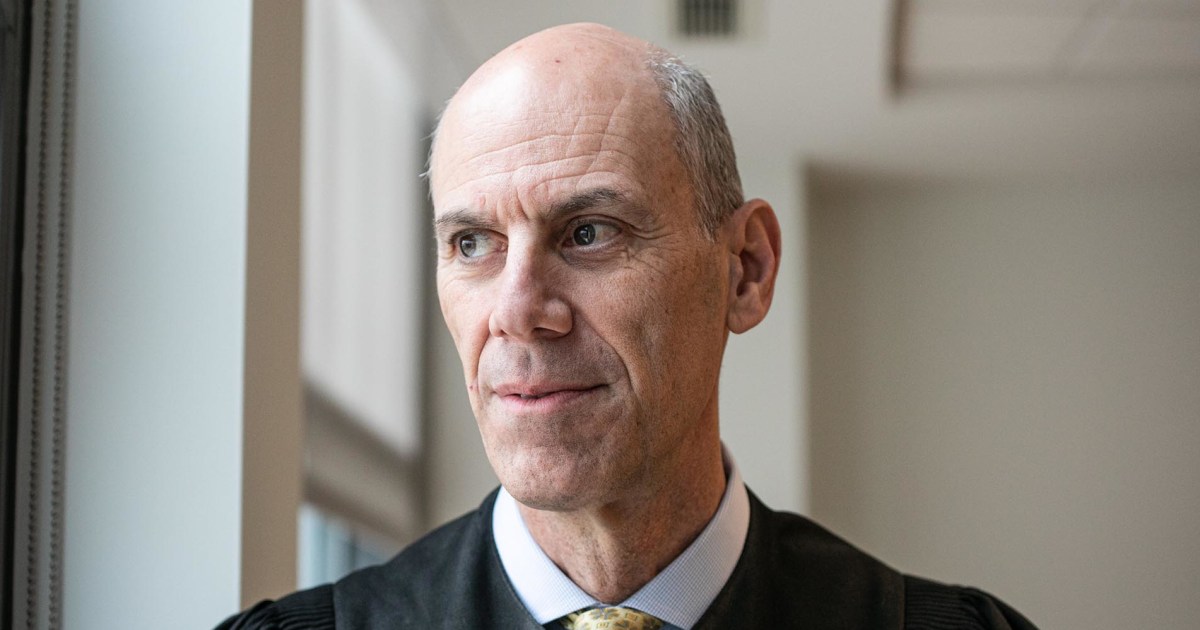
A three-judge panel of the North Carolina Court of Appeals ruled Friday that more than 65,000 votes cast in the contested race for the state Supreme Court in 2024 must be recounted and verified — a win for the Republican candidate in the razor-thin, disputed contest and a decision that could potentially tip the election results in his favor.
In the ruling, the Republican majority involved in the decision ordered that a group of more than 65,000 voters, whose eligibility was challenged by Republican Supreme Court candidate Jefferson Griffin and his lawyers, now have 15 business days to provide state elections officials with the necessary proof of identity that would verify their votes. The court ruled that any voters who don’t respond will not have their votes counted in the race between Griffin and Democrat Allison Riggs, which is still caught in legal battling five months after Election Day.
The arduous task of verifying those voter identities will fall on the North Carolina State Board of Elections. And the decision sets up an appeal to North Carolina’s highest court, the state Supreme Court — the body that the winner of this election will join.
“The inclusion of even one unlawful ballot in a vote total dilutes the lawful votes and ‘effectively disenfranchises’ lawful voters,” the Republican majority on the three-person panel wrote in its opinion. “Post-election protests protect against this risk of vote dilution by enabling candidates and voters to rigorously investigate the election process, identify and challenge unlawful ballots, and ensure those ballots are not counted.”
The one Democratic judge involved in the state Court of Appeals’ decision said the majority’s ruling amounted to “changing the rules by which these lawful voters took part in our electoral process after the election to discard their otherwise valid votes” and called the majority’s ruling an “an attempt to alter the outcome of only one race among many on the ballot is directly counter to law, equity, and the Constitution.”
The latest decision overturns a ruling by a lower state court from February that had effectively dismissed the case.
In a statement, Riggs said her campaign would appeal the ruling. Doing so is all but certain to put the case before the North Carolina state Supreme Court — the same bench whose seat is at stake in the case. Republicans currently have a 5-2 majority on that court.
“We will be promptly appealing this deeply misinformed decision that threatens to disenfranchise more than 65,000 lawful voters and sets a dangerous precedent, allowing disappointed politicians to thwart the will of the people,” Riggs said in an emailed statement. “North Carolinians elected me to keep my seat and I swore an oath to the constitution and the rule of law — so I will continue to stand up for the rights of voters in this state and stand in the way of those who would take power from the people.”
A spokesperson for the Griffin campaign didn’t immediately respond to questions on the ruling. Griffin himself sits on the Court of Appeals but recused himself from the case.
Democratic National Committee Chair Ken Martin said in a statement that “this partisan decision has no legal basis and is an all-out assault on our democracy and the basic premise that voters decide who wins their elections.”
The decision in the battleground state race is the latest chapter in a running saga since the November election.
Griffin and state Republicans have repeatedly claimed that the 65,000 votes in question should be invalidated because they were fraudulently cast by ineligible voters. Litigation over whether those votes should be counted has been stuck in both federal and state courts since the election.
A series of legal developments and rulings earlier this year put the decision in the hands of the state court system, though Riggs’ campaign hasn’t ruled out legal action that would seek to put the matter back before federal judges.
Riggs, the incumbent Democratic state Supreme Court judge who was appointed to the bench in 2023, was narrowly ahead of Griffin after Election Day, triggering a series of recounts.
A full machine recount, as well as a partial hand recount of the race, both showed Riggs leading Griffin by 734 votes. More than 5.5 million ballots were cast in the race, which the NBC News Decision Desk did not call, amid the recounts and legal cases. Even small changes to the vote count in the race could affect the outcome.
Following the original ballot count after Election Day, Griffin’s team filed hundreds of legal challenges across all of North Carolina’s 100 counties, alleging that more than 65,000 people voted illegally.
Many of the allegations centered around people who Griffin’s lawyers claimed didn’t have a driver’s license number or Social Security number on file in their voter registration records. Their protests were also related to overseas voters who haven’t lived in North Carolina and overseas voters who failed to provide photo identification with their ballots.
In its ruling Friday, the Republican majority on the Court of Appeals instructed the State Board of Elections “to immediately direct the county boards to expeditiously identify the military and overseas voters challenged under this protest and notify said voters of their failure to abide by the photo ID requirement or equivalent, to allow said voters fifteen (15) business days from the mailing of the notice to cure the defect, and upon verification, to include in the count of this challenged election the votes of those voters who timely cure their failure to abide by the photo ID requirement and to omit from the final count the votes of those voters who fail to timely cure their deficiencies.”
In their ruling, the two Republicans said that overseas voters who have never lived in North Carolina should not have their ballots counted.








